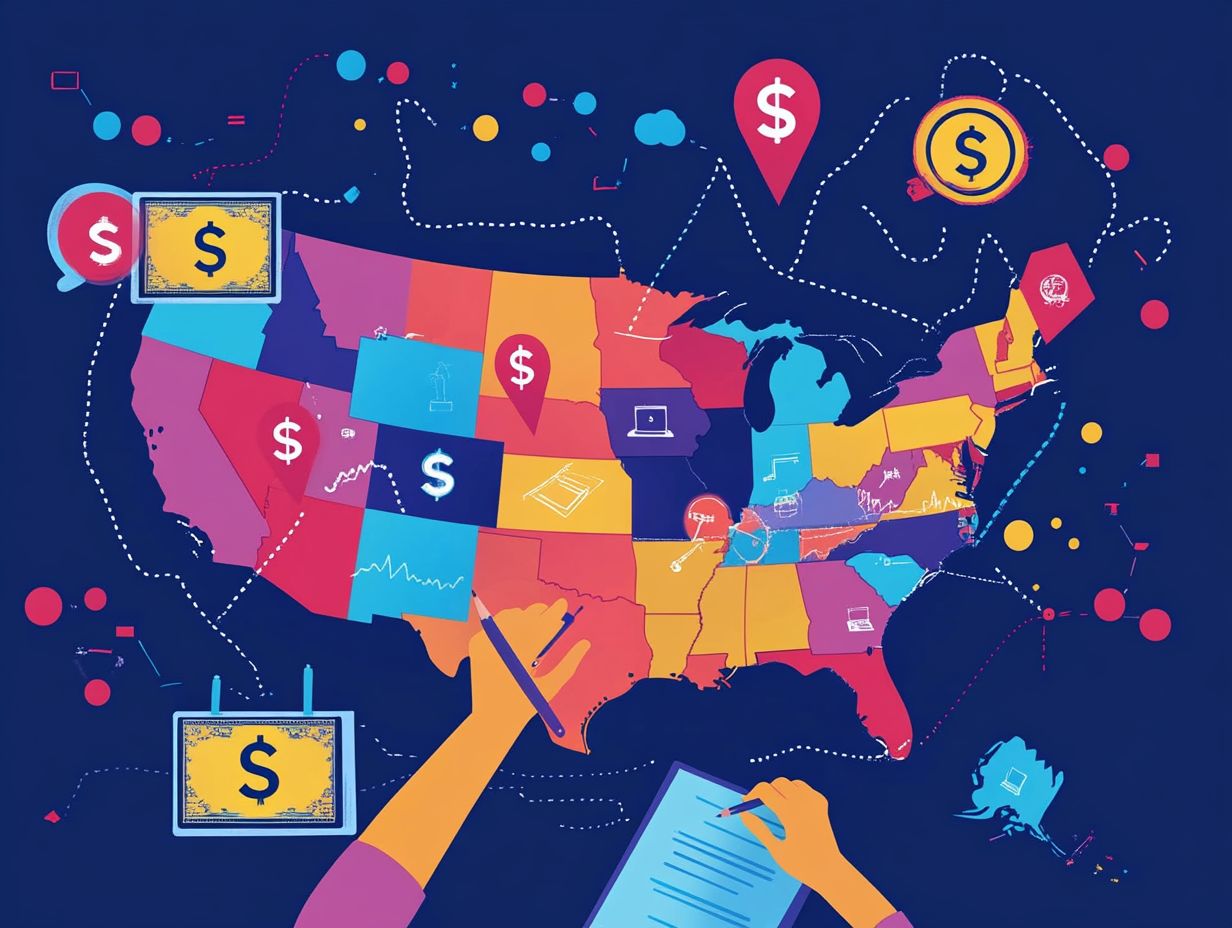Navigating Tax Laws for Freelancers by State
Freelancing provides you with the freedom and independence you crave, but it also presents distinct tax challenges that you must navigate. Get ready to dive in and conquer tax season with confidence!
Grasping tax laws can feel overwhelming, particularly with the myriad of regulations that differ from state to state. This article simplifies the critical elements of tax compliance for freelancers, highlighting state-specific laws, valuable deductions, and essential filing deadlines during tax season.
With practical tips at your disposal, you can maximize your deductions and steer clear of penalties. Whether you re an experienced freelancer or just embarking on this journey, this guide will empower you with the knowledge needed to tackle your tax responsibilities confidently.
Contents
- Key Takeaways:
- Understanding Tax Laws for Freelancers
- State Tax Laws for Freelancers
- Tax Deductions for Freelancers
- Filing Taxes as a Freelancer
- Tips for Navigating State Tax Laws
- Resources for Freelancers
- Frequently Asked Questions
- What are tax laws for freelancers by state?
- How do tax laws for freelancers differ from those for traditional employees?
- What information do I need to know about tax laws for freelancers by state?
- Do tax laws for freelancers differ between states?
- How can I ensure I am complying with tax laws for freelancers by state?
- What are some common mistakes freelancers make when navigating tax laws by state?
Key Takeaways:

- Freelancers must understand state tax laws to avoid penalties and maximize deductions, especially for self-employed individuals in freelance work.
- Each state has its own tax laws for freelancers, including federal taxes and state taxes, so it is important to research and stay updated.
- Utilizing helpful resources, such as tax filing services, can make managing state tax laws easier for freelancers.
Understanding Tax Laws for Freelancers
Understanding tax laws as a freelancer is essential for managing your finances in the freelance work landscape. This encompasses a diverse array of self-employed individuals, from digital nomads to traditional freelancers.
In this ever-evolving world of tax regulations, you must familiarize yourself with federal, state, and local taxes. Additionally, understanding estimated taxes payments made to the government based on how much you expect to earn is crucial, especially for freelancers. Exploring tax tips for freelancers in the gig economy can greatly affect your annual returns.
Mastering the intricacies of tax deductions and obligations is crucial for staying compliant with the IRS. For freelancers who work abroad, understanding specific tax tips is essential. It also ensures your contributions to Social Security and Medicare are in check while enabling you to engage in effective financial planning.
What are Freelancers?
Freelancers are self-employed individuals who offer their services on a project basis, elegantly navigating the freelance work landscape with a level of flexibility and autonomy that many dream of. Imagine the freedom!
By operating outside the confines of a traditional 9-to-5 job, you gain the freedom to select your projects and craft your own schedule. Unlike conventional employees, who may enjoy the stability of a regular paycheck and benefits, freelancers thrive in a world of variability, often juggling multiple tasks across different companies.
This lifestyle enables creative professionals to showcase their skills in various fields, from graphic design to content writing. This lifestyle also opens exciting opportunities to work while traveling. With just an internet connection, you can work from exotic locations around the globe, seamlessly blending work and travel while contributing to the evolving landscape of remote work.
State Tax Laws for Freelancers
State tax laws for freelancers can differ dramatically across the United States. In states like California, New York, and Florida, self-employed individuals face unique regulations that require careful navigation to meet their tax obligations successfully.
Grasping these distinctions is essential for freelancers, as the variation in state taxes can significantly affect overall earnings, dictate payment schedules, and necessitate meticulous record-keeping to ensure compliance with both state and federal tax authorities.
Overview of Tax Laws by State
An overview of tax laws by state reveals a complex web of regulations that you, as a freelancer, must navigate. Each state, from New York to California to Florida, imposes distinct tax obligations that mirror its unique economic landscape.
Take New York, for example. Here, you’ll encounter a progressive income tax system with rates that can climb quite high. It also has stringent filing requirements that demand quarterly estimated tax payments. For freelancers, understanding these nuances is crucial, so referring to the freelancer’s guide to state-specific tax regulations can help make it feel less like a juggling act.
Then there’s California, which operates under a progressive tax structure. You can find certain business-related deductions to help lighten your taxable income. However, the landscape is rife with its own complexities, including the potential burden of high self-employment taxes that freelancers pay on their earnings. To navigate these challenges, consider following 5 essential tax tips for creative freelancers.
In stark contrast, Florida offers a refreshing break with its absence of state income tax, making it a simpler taxation environment. However, it s not entirely smooth sailing. Local sales taxes and county-specific licenses can still throw a wrench in your plans.
Understanding these details is essential for freelancers like you who aim to optimize your tax situation while ensuring compliance.
Tax Deductions for Freelancers

Tax deductions for freelancers are essential in minimizing your taxable income. They enable you to maximize your earnings while expertly navigating the intricacies of tax filing.
This is especially crucial during tax season, when estimated taxes are due and the IRS takes a closer look at deductions. Using these deductions can greatly improve your finances.
Common Deductions for Freelancers
Common deductions for freelancers include expenses tied to a home office, travel costs for business meetings, and various operational expenses. These can significantly lower your taxable income when filing taxes with the IRS.
The home office deduction is particularly beneficial. It allows you to claim a portion of your rent or mortgage, utilities, and internet expenses for the space you use exclusively for work. Travel expenses incurred while meeting clients or attending conferences are also deductible, covering essentials like airfare, lodging, and meals.
You can also deduct costs for materials, subscriptions to industry-specific journals, and even software that enhances your craft. To substantiate these deductions, keep meticulous records and receipts. They provide the necessary proof during tax filing and can safeguard you in the event of an audit.
Filing Taxes as a Freelancer
Filing taxes as a freelancer presents a distinctive array of responsibilities that set you apart from traditional employees. You’ll need to be attuned to the details of quarterly tax payments. Ultimately, you’ll prepare an annual tax return that adheres to IRS regulations and fulfills all your tax obligations.
Important Deadlines and Forms
Important deadlines and forms for freelancers represent critical milestones throughout the tax year. Specific submissions are required by the IRS to ensure compliance and avoid penalties.
Stay alert! Missing deadlines can lead to fees. For instance, quarterly estimated tax payments are due in April, June, September, and January of the following year. These payments help you manage your tax liability throughout the year, so it’s important to understand taxable income for freelancers.
The final annual tax return must be filed by April 15, using Form 1040 along with Schedule C to report profit and loss from your business activities. Familiarizing yourself with these requirements aids in your financial planning and secures peace of mind, knowing you’re on solid ground with your tax responsibilities. Understanding the tax implications of freelance side hustles can also be beneficial.
Navigating state tax laws can be a daunting task for freelancers. However, employing effective strategies can make all the difference. By maximizing deductions and steering clear of penalties, you ensure compliance and enhance your financial planning in what can often feel like a complex tax landscape.
Maximizing Deductions and Avoiding Penalties

Maximizing deductions while avoiding penalties is essential for freelancers. It demands a thorough understanding of your tax obligations and IRS (the Internal Revenue Service, the U.S. tax collection agency) guidelines to ensure accurate filing and the best possible financial outcomes.
To navigate this intricate landscape effectively, you should embrace careful record-keeping, diligently tracking every business-related expense. You can also use digital tools and apps to streamline this process, making it easy to categorize and retrieve receipts. Leveraging resources like tax preparation software or professional services can provide valuable insights into deductions tailored to your industry, especially when considering freelancing while traveling: tax implications.
Staying updated on evolving tax laws is equally important. This knowledge not only helps you avoid potential pitfalls but also ensures compliance with IRS guidelines, ultimately protecting your financial well-being. For new freelancers, following tax planning tips can be particularly beneficial.
Resources for Freelancers
You ll find a wealth of resources tailored for freelancers, providing essential tools and services that simplify tax filing and enhance financial management. Consider platforms like Everlance and Collective, which are designed specifically for self-employed individuals like you. They help you navigate the intricacies of your financial obligations with ease and sophistication.
Useful Tools and Services for Tax Filing
Useful tools and services for tax filing enable you to manage your financial records efficiently and streamline the entire tax filing process. Platforms like Everlance and Collective come equipped with specialized features designed for your unique needs as a self-employed individual. If you operate as an LLC (Limited Liability Company), these tools can also help ensure you meet your Social Security and Medicare obligations.
These tools simplify essential tasks like expense tracking, allowing you to automatically log business expenses through mileage tracking and receipt scanning. Invoicing becomes easier with integrated services that let you create professional invoices, send them promptly, and even set up recurring billing for your regular clients.
They also assist in tax preparation by gathering relevant financial data, calculating potential deductions, and keeping you informed about tax law compliance. For freelancers, knowing how to handle tax audits is crucial. By leveraging these specialized platforms, you can significantly reduce the stress that tax season can bring. This allows you to focus your energy on what you do best—your creative work.
Frequently Asked Questions
What are tax laws for freelancers by state?

Tax laws for freelancers by state refer to the specific regulations and requirements that self-employed individuals must adhere to when filing their taxes. These laws vary by state and can impact the taxes owed, deductions available, and reporting responsibilities for freelancers. For instance, freelancers in California may face different obligations compared to those in New York or Florida.
How do tax laws for freelancers differ from those for traditional employees?
Freelancers have unique tax responsibilities. Unlike traditional employees, they must manage their own taxes and can claim different deductions. It’s essential for freelancers to keep accurate records to ensure compliance.
What information do I need to know about tax laws for freelancers by state?
Understanding state-specific tax laws is crucial for freelancers. Know the tax rates, deadlines, and any unique rules that apply to your work. Staying updated on changes is key!
Do tax laws for freelancers differ between states?
Yes, tax laws vary by state. Each state has its own rules that affect how much freelancers pay and what deductions they can claim. Being aware of these differences is vital for accurate tax filings.
How can I ensure I am complying with tax laws for freelancers by state?
Consulting with a tax professional is the best way to comply with state laws. They can clarify your obligations and help you file correctly. Don t miss out on staying compliant!
Common mistakes include poor record-keeping and missing tax deadlines. Educate yourself and consider professional help to avoid these pitfalls. Stay informed to keep your finances in check!






